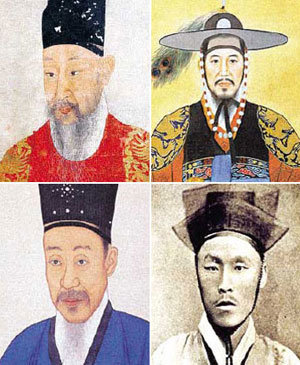Reformation through the Eyes of Korean History
Reformation through the Eyes of Korean History
Posted June. 18, 2005 04:32,

In the 10 years after the Kim Young-sam regime, reformation was a hot topic in Korean society. On one side Koreans spoke of reform fatigue, and on the other, futile reform was all the rage. Then what was the problem? Historical author of Song Shi-yeol and their Land and Jung Yak-yong and his Siblings, as well as manager of the Hangaram Cultural Institute Lee Duk-il search for the answers using methods historical reformers summoned. From the age of Three States Kim Chun-chu to the symbol of the Chosun Sarim reform, Cho Kwang-cho and the leader of the Gabshin Coup in the age of enlightenment, Kim Ok-kyun, they analyze the successes and failures of reformers. We will discover the problems of present-day reformation through the voices of the reformers.
Kim Chun-chu-
It was due to the epochal agenda that the basis of the unification of the three States could be polished. In 642, my son-in-law and daughter were killed in the Baekje attack, and I established a national vision that went beyond my personal vengeance, to unify Baekje. But around me there were only fellows warring with each other to achieve power. So I sought out my brother-in-law Kim Yoo-shin. He was actually ostracized by the Gaya forces and handed his sister over to me because he thought I was different from those secular snobs, but he got pipingly mad and set everything on fire when I ignored him. So even though I did marry that sister, for a few years we werent overly friendly. Despite all that, he managed to embrace me promptly and say, Were friends when I met him to insist, Topple Baekje! And what do you know? When I went to Goguryeo to forge an alliance and returned more dead than alive to get the unification of the three States on the move, he was the only one who acknowledged me. So it happened that I mobilized my brother-in-laws Gaya folks, wiped them all out, and became emperor. Baekjes King Uija and Goguryeos Yeongaesomun grasped power tightly, of course, but because seizing power was but a mere tool and there were bigger things in mind for Shilla, the weakest Shilla was able to unify the three nations. But whats with the epochal reform agenda nowadays, anyway?
King Taejong
I became the evil one when I got my son Sejong to become king. According to existing laws, I am an utter traitor. I vowed eternal friendship while drinking the blood of sacrificial lambs with 52 valiant founders, killing off most of them six years later by my own hand. Two years later, I killed my own siblings and ascended the throne, but this time I murdered my four brothers-in-law who helped me so kindly, just to get rid of the maternal relatives. Others thought I was after the power and cursed me, but my objective wasnt power itself. I needed to set the foundation for my son as a sacrosanct king. For him, I killed his father-in-law, threw out my firstborn son, and kicked out his lover, too. Korean presidents these days, they dont have the guts to spit out their family, much less founders.
Jeongjo
I hear a lot of people around me comparing the president with me because I tried to eradicate the forces Noron, tried to move the capital to a newly-built Hwaseong, and tried to put the outsider elites in the reform frontier through the Gyujunggak. But this is all ignorance. I was never past-oriented, I always looked to the future. I curbed the Noron but to keep them from turning into enemies, I embraced them. Furthermore, the construction of Hwaseong wasnt out of a strategic political move to weaken the Seoul-centered Noron. It was part of a livelihood reform to make Hwaseong into a paragon city of commercial and agricultural revolution and propagate it nationwide. Also, fostering talent through the Gyujunggak wasnt a partisan scheme, but an epochal project, to educate regardless of status. Is your reform as comprehensive and futuristic as mine?
Chae-Hyun Kwon confetti@donga.com






